Femia > Health Library > Getting Pregnant > Trying to conceive > 16 DPO: What to expect, and how to tell if you’re pregnant
16 DPO: What to expect, and how to tell if you’re pregnant
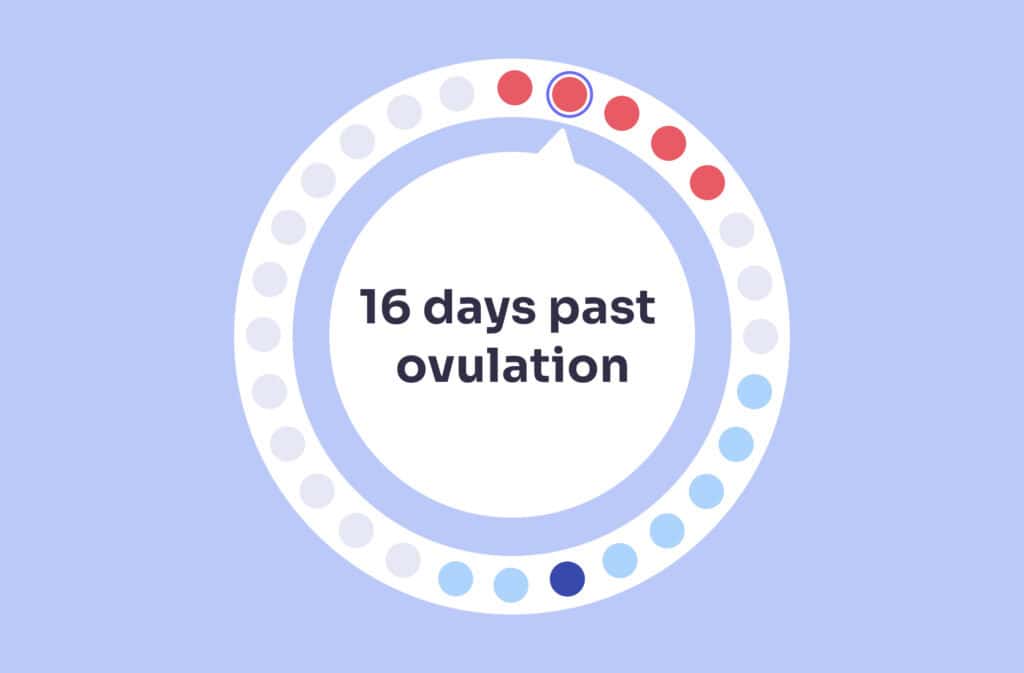
- Updated Feb 25, 2025
- Published
CRAFTED BY HUMAN
Crafted by human At Femia, we provide accurate and up-to-date information at every stage of your journey, from trying to conceive, pregnancy and postnatal support. All content is created by a real person based on in-depth research and own professional experience. Femia ensures that you will receive expert advice, strict accuracy and a personalized approach from our authors/medical experts. Learn more about our editorial policy.
FACT CHECKED
Fact checked At Femia Health, we maintain the highest standards of editorial excellence in delivering content focused on helping you conceive, guiding you through pregnancy, and supporting you postpartum. Explore our content review principles to learn how we ensure the accuracy and quality of our health and lifestyle tips for every stage of your journey.
At 16 DPO (16 days past ovulation):
- You’re well past the typical luteal phase length. Your period is likely 2-3 days late if you have a regular 28-day cycle.
- If pregnant, hCG levels should be easily detectable by most pregnancy tests.
- Early pregnancy symptoms may be quite noticeable for many women.
- 16 DPO symptoms can be strong indicators of early pregnancy.
Welcome to 16 DPO! You’ve reached a significant milestone in your cycle, and you might be feeling a mix of emotions right now. Whether you’re hoping for a positive pregnancy test or wondering about your late period, remember that you’re not alone in this experience. Let’s explore what might be happening in your body and what signs you could be noticing at this important time.
➡️ Read other Femia guides in this series:
- 1 DPO: What to expect, and how to tell if you’re pregnant
- 2 DPO: What to expect, and how to tell if you’re pregnant
- 3 DPO: What to expect, and how to tell if you’re pregnant
- 4 DPO: What to expect, and how to tell if you’re pregnant
- 5 DPO: What to expect, and how to tell if you’re pregnant
- 6 DPO: What to expect, and how to tell if you’re pregnant
- 7 DPO: What to expect, and how to tell if you’re pregnant
- 8 DPO: What to expect, and how to tell if you’re pregnant
- 9 DPO: What to expect, and how to tell if you’re pregnant
- 10 DPO: What to expect, and how to tell if you’re pregnant
- 11 DPO: What to expect, and how to tell if you’re pregnant
- 12 DPO: What to expect, and how to tell if you’re pregnant
- 13 DPO: What to expect, and how to tell if you’re pregnant
- 14 DPO: What to expect, and how to tell if you’re pregnant
- 15 DPO: What to expect, and how to tell if you’re pregnant
What does 16 DPO mean?
16 DPO stands for “16 days past ovulation.” At this point, you’re well beyond the average luteal phase length, which typically lasts 12-14 days. For many women with a 28-day cycle, their period would have been expected 2-3 days ago.
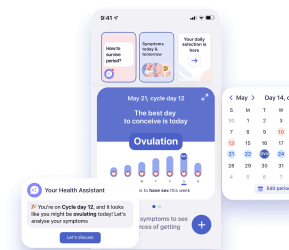
What's happening in your body at 16 DPO?
At 16 DPO, your body is likely in one of two states:
If pregnant:
- Hormone levels: hCG is rising rapidly, supporting early pregnancy development.
- Uterine changes: The uterine lining is thick and nurturing the growing embryo.
- Early embryo development: The embryo is growing quickly and starting to form basic structures.
If not pregnant:
- Hormone levels: Estrogen and progesterone levels have dropped significantly.
- Uterine changes: The uterine lining may be starting to shed, leading to a delayed period.
16 DPO symptoms: What might you be experiencing?
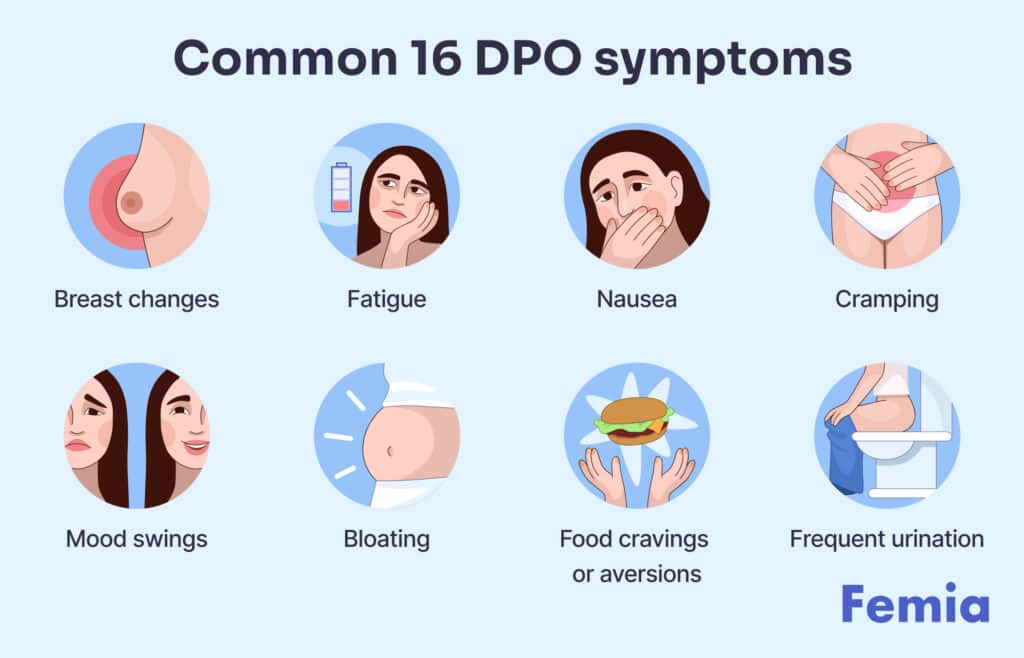
At 16 DPO, symptoms can be quite noticeable, especially if you’re pregnant. Here’s what you might be feeling:
- Breast changes: Increased tenderness, swelling, or darkening of the areolas.
- Fatigue: You might feel more tired than usual, especially if pregnant.
- Nausea: Morning sickness may be starting for some women.
- Cramping: You might experience mild cramping, whether pregnant or about to start your period.
- Mood swings: Hormonal changes can lead to emotional fluctuations.
- Bloating: You might feel puffy or bloated in your abdomen.
- Frequent urination: This can be an early sign of pregnancy.
- Food aversions or cravings: These can be quite noticeable in early pregnancy.
Remember, everyone’s body is different. You might experience all, some, or none of these symptoms. Trust your instincts and don’t hesitate to reach out to a healthcare provider if you have any concerns.
16 DPO: No period
If you’re 16 DPO with no period, it could mean:
- Pregnancy: This is a common reason for a missed period at 16 DPO.
- Delayed ovulation: Your ovulation might have occurred later than usual this cycle.
- Hormonal imbalance: Stress, lifestyle changes, or medical conditions can affect your cycle.
If you’re trying to conceive, this can be an exciting yet anxious time. A pregnancy test at this stage should give you a reliable result.
👉Find out more: Fertility diet: What to eat to boost your chances of getting pregnant
16 DPO: hCG levels
At 16 DPO, hCG levels in pregnant women typically range from 25-400 mIU/mL.
However, these numbers can vary widely. What’s most important is how your hCG levels change over time, not a single measurement.
16 DPO: How many weeks pregnant?
If you’re pregnant at 16 DPO, you’re considered to be about 4 weeks and 2 days pregnant. This might seem confusing, but pregnancy is typically counted from the first day of your last menstrual period, not from conception.
16 DPO: Positive pregnancy test
At 16 DPO, most home pregnancy tests should be able to detect pregnancy.
If you get a positive test, congratulations! Here’s what you might want to do next:
- Confirm the result with a second test.
- Schedule an appointment with your healthcare provider.
- Start taking prenatal vitamins if you haven’t already.
- Avoid alcohol, smoking, and limit caffeine intake.
👉Find out more: Evaporation line vs. faint positive: How to tell the difference on your pregnancy test
16 DPO: Cramping but no period
Cramping at 16 DPO without a period could indicate:
- Early pregnancy: Mild cramping can occur as the uterus begins to change.
- Delayed period: Your body might be preparing to start your period.
- Ectopic pregnancy: Though rare, this is a possibility. If cramping is severe, contact your healthcare provider.
16 DPO: BFN success stories
While most pregnant women will get a positive test by 16 DPO, some women have shared stories of getting a negative result (often called a BFN or Big Fat Negative) at 16 DPO, only to later confirm their pregnancy. These experiences can happen for a few reasons:
- Your body might be taking a little more time with implantation.
- Your hCG levels could be rising more slowly than average.
- The sensitivity of home pregnancy tests can vary.
If you’ve gotten a negative test at 16 DPO but still feel you might be pregnant, don’t lose hope. Your journey is unique, and it’s not over yet. Consider waiting a few more days and testing again, preferably with your first morning urine.
16 DPO: 3 days late—pregnancy symptoms
If you’re 3 days late at 16 DPO and pregnant, you might be experiencing:
- Missed period;
- Breast tenderness or swelling;
- Fatigue;
- Mild cramping or twinges in the lower abdomen;
- Nausea or food aversions;
- Frequent urination;
- Mood swings;
- Bloating.
Remember, these symptoms can vary greatly from person to person, and some women might not experience any symptoms at all at this stage.

Questions from the Femia community
I'm 16 DPO with no period, but my pregnancy test is still negative. What should I do?
This can be a confusing and potentially stressful situation. It's possible that you ovulated later than you thought, which would extend your cycle. It's also possible that you're pregnant but your hCG levels aren't high enough to detect yet. The best course of action is to wait a few more days and test again. If your period doesn't arrive and you continue to get negative tests, it would be a good idea to consult with your healthcare provider.
Can stress delay my period even at 16 DPO?
Yes, stress can indeed affect your menstrual cycle, even at 16 DPO. Stress can delay ovulation, which in turn delays your period. If you've been under significant stress lately, this could explain a late period. However, at 16 DPO, it's also worth considering taking a pregnancy test if you haven't already. If your period is more than a week late, it's a good idea to consult with your doctor.
I'm experiencing some unusual cramping at 16 DPO. Should I be concerned?
Cramping at 16 DPO can be normal, whether you're pregnant or about to start your period. If you're pregnant, it could be due to your uterus beginning to stretch. If you're not, it could be the start of menstrual cramps. However, if the cramping is severe, accompanied by heavy bleeding, or you're concerned for any reason, it's always best to consult with your healthcare provider. They can provide personalized advice based on your specific situation.
The bottom line
At 16 DPO, you’re at a significant point where pregnancy can usually be confirmed or ruled out with a high degree of accuracy. If you’re trying to conceive, this can be an emotional time filled with hope, anxiety, or a mix of both. Remember to be kind to yourself, whatever the outcome.
If you get a positive pregnancy test, congratulations! It’s an exciting new chapter, and it’s normal to feel a range of emotions. Consider scheduling an appointment with your healthcare provider to confirm the pregnancy and begin prenatal care.
If your test is negative and your period arrives, it’s okay to feel disappointed. Each cycle is a new opportunity, and your body is doing its best. Remember that fertility is a journey, and it’s different for everyone.
No matter where you are in your journey, your feelings are valid. Don’t hesitate to seek support from loved ones or healthcare professionals if you need it. You’re doing a great job navigating this process, and there’s a whole community here to support you. Keep taking care of yourself – you’ve got this!
➡️ Read other Femia guides in this series:
- 1 DPO: What to expect, and how to tell if you’re pregnant
- 2 DPO: What to expect, and how to tell if you’re pregnant
- 3 DPO: What to expect, and how to tell if you’re pregnant
- 4 DPO: What to expect, and how to tell if you’re pregnant
- 5 DPO: What to expect, and how to tell if you’re pregnant
- 6 DPO: What to expect, and how to tell if you’re pregnant
- 7 DPO: What to expect, and how to tell if you’re pregnant
- 8 DPO: What to expect, and how to tell if you’re pregnant
- 9 DPO: What to expect, and how to tell if you’re pregnant
- 10 DPO: What to expect, and how to tell if you’re pregnant
- 11 DPO: What to expect, and how to tell if you’re pregnant
- 12 DPO: What to expect, and how to tell if you’re pregnant
- 13 DPO: What to expect, and how to tell if you’re pregnant
- 14 DPO: What to expect, and how to tell if you’re pregnant
- 15 DPO: What to expect, and how to tell if you’re pregnant
References
- American College of Obstetricians and Gynecologists (ACOG). “Early Pregnancy Loss: Miscarriage and Molar Pregnancy.” ACOG Practice Bulletin, no. 200, 2018, pp. 1-10. The American College of Obstetricians and Gynecologists. https://www.acog.org/clinical/clinical-guidance/practice-bulletin/articles/2018/11/early-pregnancy-loss.
- “Luteal Phase, an overview.” ScienceSirect. https://www.sciencedirect.com/topics/medicine-and-dentistry/luteal-phase.
- Wilcox, Allen J., et al. “Time of Implantation of the Conceptus and Loss of Pregnancy.” New England Journal of Medicine, vol. 340, no. 23, 1999, pp. 1796-1799. National Library of Medicine.
- Sapra, Katherine J., et al. “Signs and Symptoms Associated With Early Pregnancy Loss: Findings From a Population-Based Preconception Cohort.” Human Reproduction, vol. 31, no. 4, 2016, pp. 887-896. https://www.researchgate.net/publication/296682402_Signs_and_symptoms_associated_with_early_pregnancy_loss_Findings_from_a_population-based_preconception_cohort.
- National Institutes of Health. “What are some common signs of pregnancy?” National Institute of Child Health and Human Development, 2017. https://www.nichd.nih.gov/health/topics/pregnancy/conditioninfo/signs.
- Mayo Clinic Staff. “Home pregnancy tests: Can you trust the results?” Mayo Clinic, 2022. https://www.mayoclinic.org/healthy-lifestyle/getting-pregnant/in-depth/home-pregnancy-tests/art-20047940.
- U.S. Food and Drug Administration. “Pregnancy.” FDA, 2019. https://www.fda.gov/medical-devices/home-use-tests/pregnancy.
- Johnson, Sarah R., et al. “Levels of Urinary Human Chorionic Gonadotrophin (hCG) Following Conception and Variability of Menstrual Cycle Length in a Cohort of Women Attempting to Conceive.” Current Medical Research and Opinion, vol. 25, no. 3, 2009, pp. 741-748. https://pubmed.ncbi.nlm.nih.gov/19196217/.
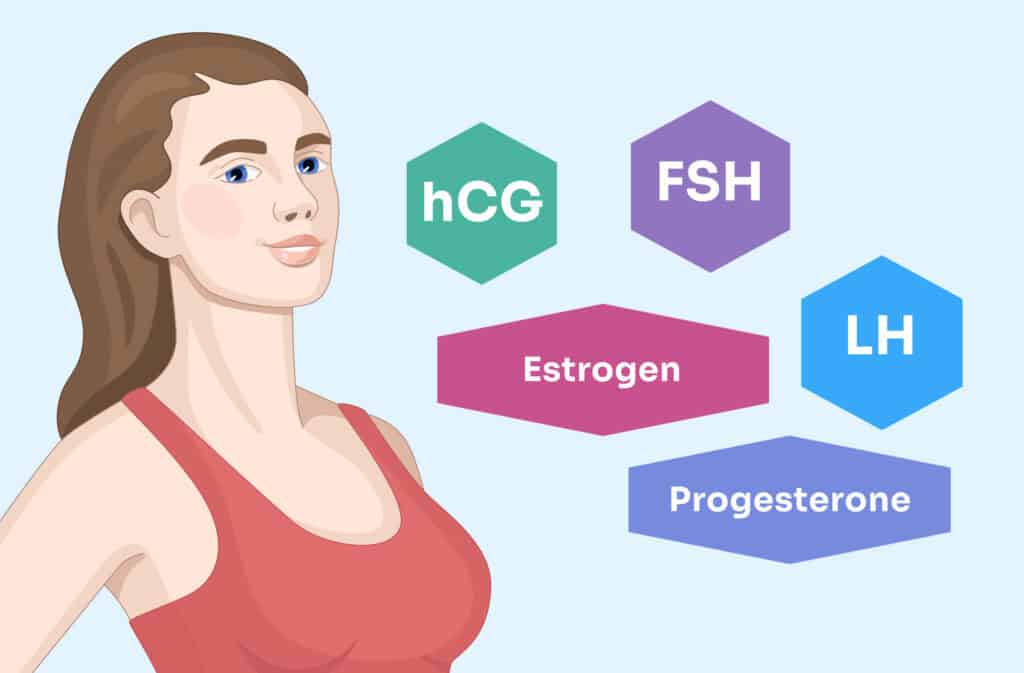
Discover everything you need to know about female fertility hormones and tips to balance essential reproductive hormones and support a healthy conception in women.
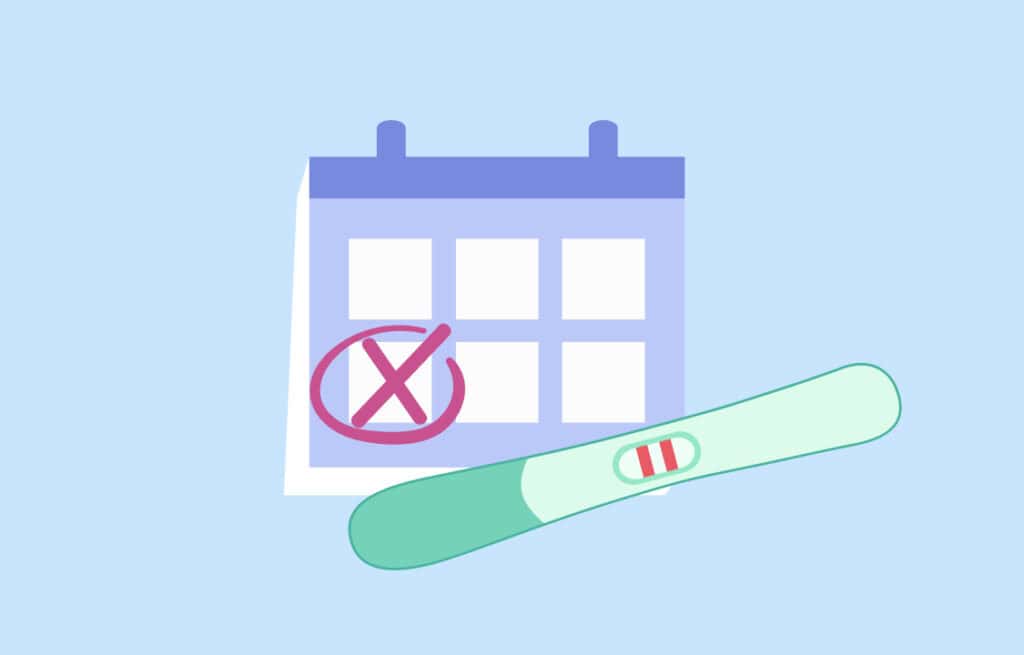
Learn about the process of implantation, discover the early signs, such as implantation bleeding and cramping, and how the hormone hCG becomes detectable soon after.
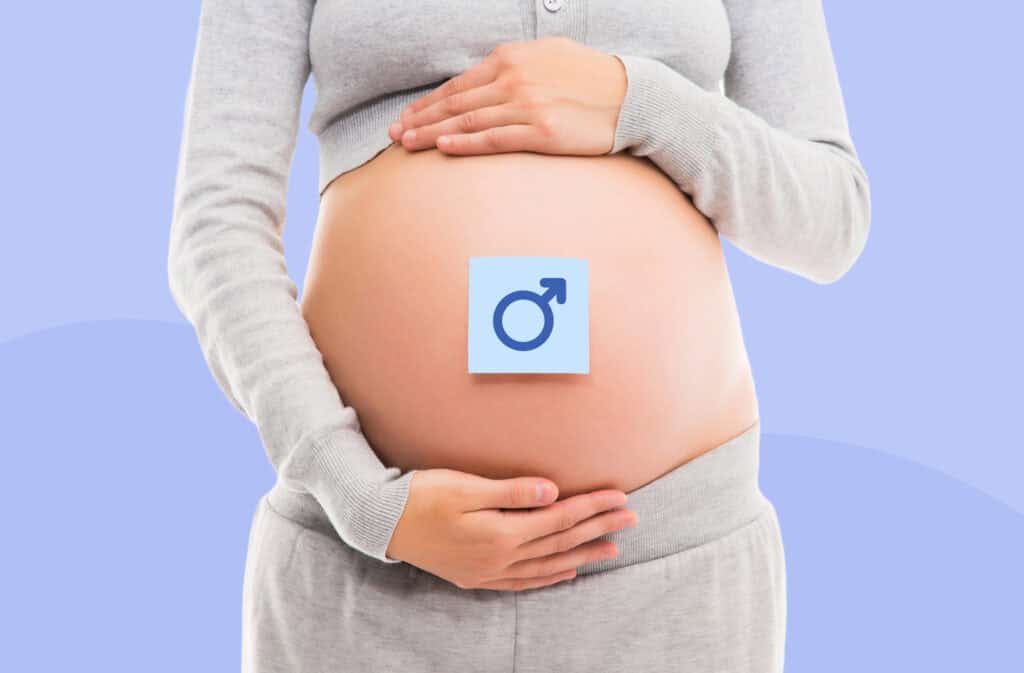
Explore methods like the Shettles method and medical interventions for conceiving a boy. Learn about effectiveness, myths, and your real chances based on science.

